Assertion: The loss of biologically useful energy as heat with every energy transfer in a food chain is a consequence of the second law of thermodynamics.
Reason: Energy does not remain trapped permanetly in any organism. It is either passed on to higher trophic level or becomes available to detritivores and decomposers after the organism dies.
The correct Answer is:B
To solve the assertion-reason question, we need to analyze both statements and determine their validity and relationship.
Step 1: Analyze the Assertion
The assertion states that "The loss of biologically useful energy as heat with every energy transfer in a food chain is a consequence of the second law of thermodynamics."
- According to the second law of thermodynamics, energy transformations are not 100% efficient. When energy is transferred from one trophic level to another in a food chain, some energy is lost as heat. This aligns with the principle that energy tends to disperse and increase in entropy. Therefore, the assertion is true.
Step 2: Analyze the Reason
The reason states that "Energy does not remain trapped permanently in any organism. It is either passed on to a higher trophic level or becomes available to detritivores and decomposers after the organism dies."
- This statement is also accurate. Energy is transferred through various trophic levels in an ecosystem. When an organism dies, its energy becomes available to decomposers and detritivores, contributing to nutrient cycling. Thus, the reason is also true.
Step 3: Determine the Relationship
Now, we need to assess whether the reason correctly explains the assertion.
- While both statements are true, the reason does not directly explain why energy loss occurs as heat during energy transfer. The assertion focuses on the thermodynamic principle, while the reason discusses energy transfer and decomposition processes. Therefore, they are not causally related.
Conclusion
Both the assertion and reason are true, but the reason is not the correct explanation for the assertion.
Thus, the correct answer is: Both assertion and reason are true, but reason is not the correct explanation of assertion.
---
The assertion states that "The loss of biologically useful energy as heat with every energy transfer in a food chain is a consequence of the second law of thermodynamics."
The reason states that "Energy does not remain trapped permanently in any organism. It is either passed on to a higher trophic level or becomes available to detritivores and decomposers after the organism dies."
Now, we need to assess whether the reason correctly explains the assertion.
Both the assertion and reason are true, but the reason is not the correct explanation for the assertion.
Topper's Solved these Questions
- ECOSYSTEMBOOK - NCERT FINGERTPS ENGLISHCHAPTER - ECOSYSTEMEXERCISE - Ecosystem
140 Videos
- BIOTECHNOLOGY AND ITS APPLICATIONBOOK - NCERT FINGERTPS ENGLISHCHAPTER - BIOTECHNOLOGY AND ITS APPLICATIONEXERCISE - Biotechnology And Its Application
137 Videos
- ENVIRONMENTAL ISSUESBOOK - NCERT FINGERTPS ENGLISHCHAPTER - ENVIRONMENTAL ISSUESEXERCISE - Environmental Issues
142 Videos
Similar Questions
Assertion:- Most of the food chain can be complete with predation.
Reason:- Predation act as condult for energy transfer across trophic levels.
View SolutionRead the following statements.
(i) Removal of tigers from an area will result in increased growth of vegetation of that area.
(ii) Organisms at each trophic level depend on those at the lower trophic level for their energy demands.
(iii) Food chains are sustained by producers and decomposers
(iv) In a food chain , some organism like sparrow operates at one trophic level only.
Select an option which shows CORRECT statements.
View Solution
Knowledge Check
Assertion : First law of thermodynamics does not forbid flow of heat from lower temperature to higher temperature.
Reason : Heat supplied to a system always equal to the increase in its internal energy.ABoth assertion and reason are true and reason is the correct explanation of assertionBBoth assertion and reason are true but reason is not the correct explanation of assetionCAssertion is true but reason is falseDBoth assertion and reason are false.Study the following statements and select the incorrect ones.
(i) Pyramids of energy and yearly biomass production can never be inverted, since this would violate the laws of thermodynamics.
(ii) Pyramids of standing crop and numbers can be inverted, since the number of organisms at a time does not indicate the amount of energy flowing through the system.
(iii) There are certain limitations of ecological pyramids such as they do not take into account the same species belonging to two or more trophic levels.
(iv) Saprohytes are not given any place in ecological pyramids even though they play a vital role in the ecosystem.AI and iiBiii and ivCii and iiiDNone of theseThe Hype of Healthier Organic Food
Some people buy organic food because they believe organically grown crops are more nutritious and safer for consumption than the people who purchase their conventionally grown counter parts, which are usually produced with pesticide sand synthetic fertilizers. In the name of health, spending. $1.60 for every dollar they would have spent on food that is grown in a manner that is considered conventional. Scientific evidence, therefore, suggests that consumers do not reap significant benefits, in terms of either nutritional value or safety, from organic food.
Although advocates of organic food preserve that organic produce is healthier than conventionally grown produce because it has more vitamins and minerals, this assertion is not supported by scientific research. For instance, one review published in The American Journal of Clinical Nutrition provided analysis of the results of comparative studies conducted over a span of 50years, researchers consistently found no evidence thatorganic crops are more nutritious than conventionally grown one sin terms of their vitamin and mineral content. Similarly, Stanford University researchers who examined almost 250 studies comparing the nutritional content of different kinds of organic foods with that of their non organic counter parts found very little difference between the two.
Evidence also undermines the claim that organic foodis safer to eat. While researchers have foundlower levels of pesticide residue in organic produce than in non organic produce,the pesticide residue detected in conventional produce falls with in acceptable safety limits. According to such organizations as the US Environmental Protection Agency,the minute amounts of residue falling with in such limits have no negative impact on human health.
Based on scientific evidence, organic food offers neither significant nutritional or safety benefits for consumers. Proponents of organic food, of course,are quick to add that their are numerous other reasons buy organic food, such as, a desire to protect the environment from potentially damaging pesticidesora preference for the taste of organically grown foods. Research regarding these issuesis less conclusivethan the findings regarding nutritional content and pesticide residue safety limits. What is clear, though, is this: if a consumers goal is to buy the health i.e stands a fest food to eat, the increased cost of organic food is a waste of money.
At this point,the writer is consider in gadding the following sentence. The United States Department of Agriculture (USDA) reports that organic agricultural products are now available in approximately 20,000 markets specializing in natural foods. Should the writer make this addition here?AYes, because it adds are relevant research finding from a government agency.BYes, because it supports the passage’s argument that organic food is less nutritious than conventionally grown food.CNo, because it is not relevant to the paragraph’s discussion of scientific evidence.DNo,because it introduces a term that has not been defined in the passage.
When it comes to energy, everyone loves efficiency. Cutting energy waste is one of those goals that both sides of the political divide can agree on, Line even it they sometimes diverge on how best to get 5 there. Energy efficiency allows us to get more out of our given resources, which is good for the economy and (mostly) good for the environment as well. In an increasingly hot and crowded world, the only sustainable way to live is to get more out of less. to Every environmentalist would agree. But change the conversation to food, and suddenly efficiency doesn't look so good. Conventional industrial agriculture has become incredibly efficient on a simple land to kind basis. Is Thanks to fertilizers, mechanization and irrigation, each American farmer feeds over 155 people worldwide. Conventional farming gets more and more crop per square foot of cultivated land—over 170 bushels of corn per acre in Iowa, for 20 example—which can mean less territory needs to be converted from wilderness to farmland. And since a third of the planet is already used for agriculture—destroying forests and oilier wild habitats along the way--anything that help us produce more food on less land would seem to he good for the environment.Of course,that’s not how most environmentalists regard their a rugul a[a leaf ygreen].They have embraced organic food as better for the planet—and healthier and tastier,too—than the stuff produced by agricultural corporations.Environmentalists disdain the enormous amounts of energy needed and waste created by conventional farming,while organic practices—for go in gartificial fertilizers and chemical pesticides—are considered far more sustainable. Sales of organic food ros e7.7% in 2010,upto $26.7 billion—and people are making those purchases for their consciences as much as their taste buds. Yet a new meta-analysis in Nature does the math and comes to a hard conclusion:organic farming yields 25% fewer crops on a verage than conventional agriculture.More land is therefore needed to produce fewer crops—and that means organic farming may not be as good for the planet as we think.
In the Nature analysis, scientists from McGill University in Montreal and the University of Minnesota performed an analysis of 66 studies comparing conventional and organic methods across so 34 different crop species, from fruits to grains to legumes. They found that organic farming delivered a lower yield for every crop type, though the disparity varied widely. For rain-watered legume crops like beans or perennial crops like fruit trees, organic is trailed conventional agriculture by just 5%. Yet for major cereal crops like corn or wheat, as well as most vegetables—all of which provide the bulk of the world's calories—conventional agriculture outperformed organics by more than 25%. 60 The main difference is nitrogen, the chemical key to plant growth. Conventional agriculture makes use of 171 million metric tons of synthetic fertilizer each year, and all that nitrogen enables much faster plant growth than the slower release of nitrogen from the 6S compost or cover crops used in organic farming. When we talk about a Green Revolution, we really mean a nitrogen revolution—along with a lot of water. Rut not all the nitrogen used in conventional /0 fertilizer ends up in crops—much of it ends up running off the soil and into the oceans, creating vast polluted dead zones. We're already putting more nitrogen into the soil than the planet can stand over the long term. And conventional agriculture also is depends heavily on chemical pesticides, which can have unintended side effects.
What that means is that while conventional agriculture is more efficient—sometimes much more efficient—than organic farming, there are trade-offs so with each. So an ideal global agriculture system, in the views of the study's authors, may borrow the best from both systems, as Jonathan Foley of the University of Minnesota explained: The bottom line? Today's organic farming 85 practices are probably best deployed in fruit and vegetable farms, where growing nutrition (not just bulk calories) is the primary goal. But for delivering sheer calories, especially in our staple crops of wheat, rice, maize, soybeans and so on, 90 conventional farms have the advantage right now.
Looking forward, I think we will need to deploy different kinds of practices (especially new, mixed approaches that take the best of organic 95 and conventional farming systems) where they are best suited—geographically, economically, socially, etc.
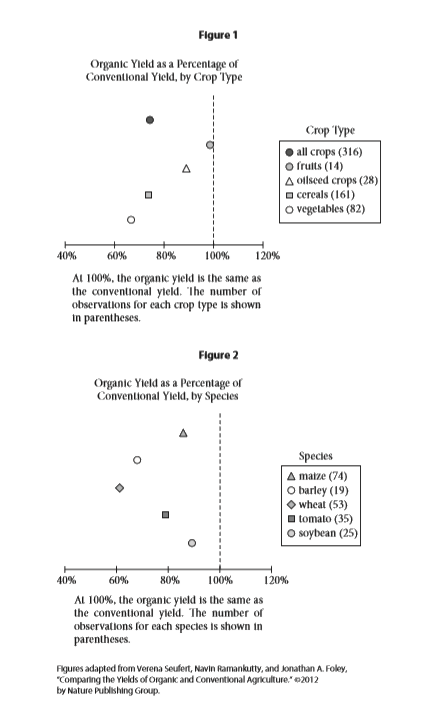
According to the passage,as ignificant attribute of conventional agriculture is its ability to
View SolutionWhen it comes to energy, everyone loves efficiency. Cutting energy waste is one of those goals that both sides of the political divide can agree on, Line even it they sometimes diverge on how best to get 5 there. Energy efficiency allows us to get more out of our given resources, which is good for the economy and (mostly) good for the environment as well. In an increasingly hot and crowded world, the only sustainable way to live is to get more out of less. to Every environmentalist would agree. But change the conversation to food, and suddenly efficiency doesn't look so good. Conventional industrial agriculture has become incredibly efficient on a simple land to kind basis. Is Thanks to fertilizers, mechanization and irrigation, each American farmer feeds over 155 people worldwide. Conventional farming gets more and more crop per square foot of cultivated land—over 170 bushels of corn per acre in Iowa, for 20 example—which can mean less territory needs to be converted from wilderness to farmland. And since a third of the planet is already used for agriculture—destroying forests and oilier wild habitats along the way--anything that help us produce more food on less land would seem to he good for the environment.Of course,that’s not how most environmentalists regard their a rugul a[a leaf ygreen].They have embraced organic food as better for the planet—and healthier and tastier,too—than the stuff produced by agricultural corporations.Environmentalists disdain the enormous amounts of energy needed and waste created by conventional farming,while organic practices—for go in gartificial fertilizers and chemical pesticides—are considered far more sustainable. Sales of organic food ros e7.7% in 2010,upto $26.7 billion—and people are making those purchases for their consciences as much as their taste buds. Yet a new meta-analysis in Nature does the math and comes to a hard conclusion:organic farming yields 25% fewer crops on a verage than conventional agriculture.More land is therefore needed to produce fewer crops—and that means organic farming may not be as good for the planet as we think.
In the Nature analysis, scientists from McGill University in Montreal and the University of Minnesota performed an analysis of 66 studies comparing conventional and organic methods across so 34 different crop species, from fruits to grains to legumes. They found that organic farming delivered a lower yield for every crop type, though the disparity varied widely. For rain-watered legume crops like beans or perennial crops like fruit trees, organic is trailed conventional agriculture by just 5%. Yet for major cereal crops like corn or wheat, as well as most vegetables—all of which provide the bulk of the world's calories—conventional agriculture outperformed organics by more than 25%. 60 The main difference is nitrogen, the chemical key to plant growth. Conventional agriculture makes use of 171 million metric tons of synthetic fertilizer each year, and all that nitrogen enables much faster plant growth than the slower release of nitrogen from the 6S compost or cover crops used in organic farming. When we talk about a Green Revolution, we really mean a nitrogen revolution—along with a lot of water. Rut not all the nitrogen used in conventional /0 fertilizer ends up in crops—much of it ends up running off the soil and into the oceans, creating vast polluted dead zones. We're already putting more nitrogen into the soil than the planet can stand over the long term. And conventional agriculture also is depends heavily on chemical pesticides, which can have unintended side effects.
What that means is that while conventional agriculture is more efficient—sometimes much more efficient—than organic farming, there are trade-offs so with each. So an ideal global agriculture system, in the views of the study's authors, may borrow the best from both systems, as Jonathan Foley of the University of Minnesota explained: The bottom line? Today's organic farming 85 practices are probably best deployed in fruit and vegetable farms, where growing nutrition (not just bulk calories) is the primary goal. But for delivering sheer calories, especially in our staple crops of wheat, rice, maize, soybeans and so on, 90 conventional farms have the advantage right now.
Looking forward, I think we will need to deploy different kinds of practices (especially new, mixed approaches that take the best of organic 95 and conventional farming systems) where they are best suited—geographically, economically, socially, etc.
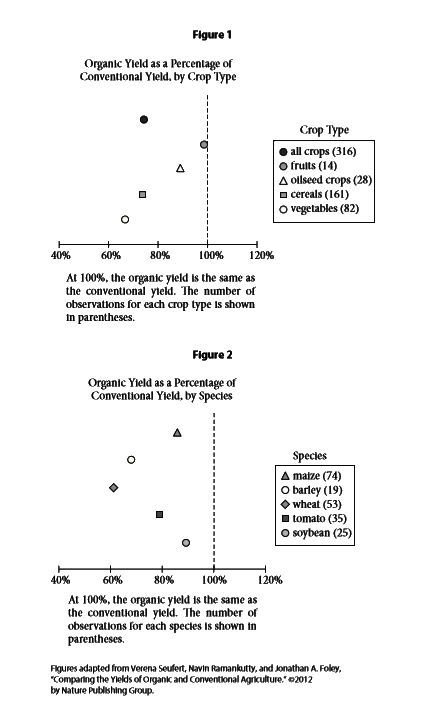
Which of the following claims is supported by figure2?
View SolutionWhen it comes to energy, everyone loves efficiency. Cutting energy waste is one of those goals that both sides of the political divide can agree on, Line even it they sometimes diverge on how best to get 5 there. Energy efficiency allows us to get more out of our given resources, which is good for the economy and (mostly) good for the environment as well. In an increasingly hot and crowded world, the only sustainable way to live is to get more out of less. to Every environmentalist would agree. But change the conversation to food, and suddenly efficiency doesn't look so good. Conventional industrial agriculture has become incredibly efficient on a simple land to kind basis. Is Thanks to fertilizers, mechanization and irrigation, each American farmer feeds over 155 people worldwide. Conventional farming gets more and more crop per square foot of cultivated land—over 170 bushels of corn per acre in Iowa, for 20 example—which can mean less territory needs to be converted from wilderness to farmland. And since a third of the planet is already used for agriculture—destroying forests and oilier wild habitats along the way--anything that help us produce more food on less land would seem to he good for the environment.Of course,that’s not how most environmentalists regard their a rugul a[a leaf ygreen].They have embraced organic food as better for the planet—and healthier and tastier,too—than the stuff produced by agricultural corporations.Environmentalists disdain the enormous amounts of energy needed and waste created by conventional farming,while organic practices—for go in gartificial fertilizers and chemical pesticides—are considered far more sustainable. Sales of organic food ros e7.7% in 2010,upto $26.7 billion—and people are making those purchases for their consciences as much as their taste buds. Yet a new meta-analysis in Nature does the math and comes to a hard conclusion:organic farming yields 25% fewer crops on a verage than conventional agriculture.More land is therefore needed to produce fewer crops—and that means organic farming may not be as good for the planet as we think.
In the Nature analysis, scientists from McGill University in Montreal and the University of Minnesota performed an analysis of 66 studies comparing conventional and organic methods across so 34 different crop species, from fruits to grains to legumes. They found that organic farming delivered a lower yield for every crop type, though the disparity varied widely. For rain-watered legume crops like beans or perennial crops like fruit trees, organic is trailed conventional agriculture by just 5%. Yet for major cereal crops like corn or wheat, as well as most vegetables—all of which provide the bulk of the world's calories—conventional agriculture outperformed organics by more than 25%. 60 The main difference is nitrogen, the chemical key to plant growth. Conventional agriculture makes use of 171 million metric tons of synthetic fertilizer each year, and all that nitrogen enables much faster plant growth than the slower release of nitrogen from the 6S compost or cover crops used in organic farming. When we talk about a Green Revolution, we really mean a nitrogen revolution—along with a lot of water. Rut not all the nitrogen used in conventional /0 fertilizer ends up in crops—much of it ends up running off the soil and into the oceans, creating vast polluted dead zones. We're already putting more nitrogen into the soil than the planet can stand over the long term. And conventional agriculture also is depends heavily on chemical pesticides, which can have unintended side effects.
What that means is that while conventional agriculture is more efficient—sometimes much more efficient—than organic farming, there are trade-offs so with each. So an ideal global agriculture system, in the views of the study's authors, may borrow the best from both systems, as Jonathan Foley of the University of Minnesota explained: The bottom line? Today's organic farming 85 practices are probably best deployed in fruit and vegetable farms, where growing nutrition (not just bulk calories) is the primary goal. But for delivering sheer calories, especially in our staple crops of wheat, rice, maize, soybeans and so on, 90 conventional farms have the advantage right now.
Looking forward, I think we will need to deploy different kinds of practices (especially new, mixed approaches that take the best of organic 95 and conventional farming systems) where they are best suited—geographically, economically, socially, etc.
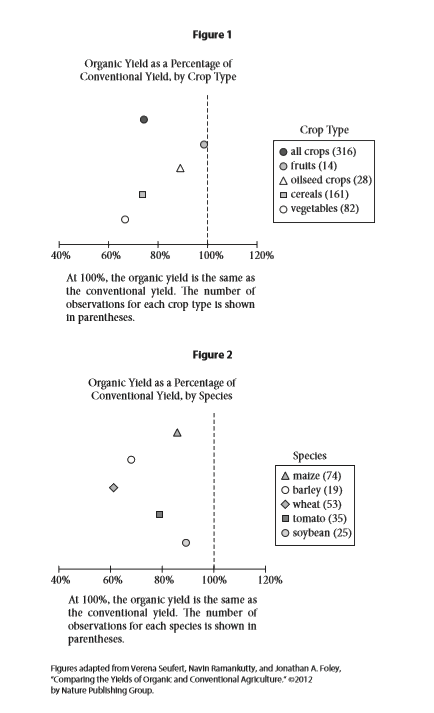
In line88,“sheer”most nearly means
View SolutionWhen it comes to energy, everyone loves efficiency. Cutting energy waste is one of those goals that both sides of the political divide can agree on, Line even it they sometimes diverge on how best to get 5 there. Energy efficiency allows us to get more out of our given resources, which is good for the economy and (mostly) good for the environment as well. In an increasingly hot and crowded world, the only sustainable way to live is to get more out of less. to Every environmentalist would agree. But change the conversation to food, and suddenly efficiency doesn't look so good. Conventional industrial agriculture has become incredibly efficient on a simple land to kind basis. Is Thanks to fertilizers, mechanization and irrigation, each American farmer feeds over 155 people worldwide. Conventional farming gets more and more crop per square foot of cultivated land—over 170 bushels of corn per acre in Iowa, for 20 example—which can mean less territory needs to be converted from wilderness to farmland. And since a third of the planet is already used for agriculture—destroying forests and oilier wild habitats along the way--anything that help us produce more food on less land would seem to he good for the environment.Of course,that’s not how most environmentalists regard their a rugul a[a leaf ygreen].They have embraced organic food as better for the planet—and healthier and tastier,too—than the stuff produced by agricultural corporations.Environmentalists disdain the enormous amounts of energy needed and waste created by conventional farming,while organic practices—for go in gartificial fertilizers and chemical pesticides—are considered far more sustainable. Sales of organic food ros e7.7% in 2010,upto $26.7 billion—and people are making those purchases for their consciences as much as their taste buds. Yet a new meta-analysis in Nature does the math and comes to a hard conclusion:organic farming yields 25% fewer crops on a verage than conventional agriculture.More land is therefore needed to produce fewer crops—and that means organic farming may not be as good for the planet as we think.
In the Nature analysis, scientists from McGill University in Montreal and the University of Minnesota performed an analysis of 66 studies comparing conventional and organic methods across so 34 different crop species, from fruits to grains to legumes. They found that organic farming delivered a lower yield for every crop type, though the disparity varied widely. For rain-watered legume crops like beans or perennial crops like fruit trees, organic is trailed conventional agriculture by just 5%. Yet for major cereal crops like corn or wheat, as well as most vegetables—all of which provide the bulk of the world's calories—conventional agriculture outperformed organics by more than 25%. 60 The main difference is nitrogen, the chemical key to plant growth. Conventional agriculture makes use of 171 million metric tons of synthetic fertilizer each year, and all that nitrogen enables much faster plant growth than the slower release of nitrogen from the 6S compost or cover crops used in organic farming. When we talk about a Green Revolution, we really mean a nitrogen revolution—along with a lot of water. Rut not all the nitrogen used in conventional /0 fertilizer ends up in crops—much of it ends up running off the soil and into the oceans, creating vast polluted dead zones. We're already putting more nitrogen into the soil than the planet can stand over the long term. And conventional agriculture also is depends heavily on chemical pesticides, which can have unintended side effects.
What that means is that while conventional agriculture is more efficient—sometimes much more efficient—than organic farming, there are trade-offs so with each. So an ideal global agriculture system, in the views of the study's authors, may borrow the best from both systems, as Jonathan Foley of the University of Minnesota explained: The bottom line? Today's organic farming 85 practices are probably best deployed in fruit and vegetable farms, where growing nutrition (not just bulk calories) is the primary goal. But for delivering sheer calories, especially in our staple crops of wheat, rice, maize, soybeans and so on, 90 conventional farms have the advantage right now.
Looking forward, I think we will need to deploy different kinds of practices (especially new, mixed approaches that take the best of organic 95 and conventional farming systems) where they are best suited—geographically, economically, socially, etc.
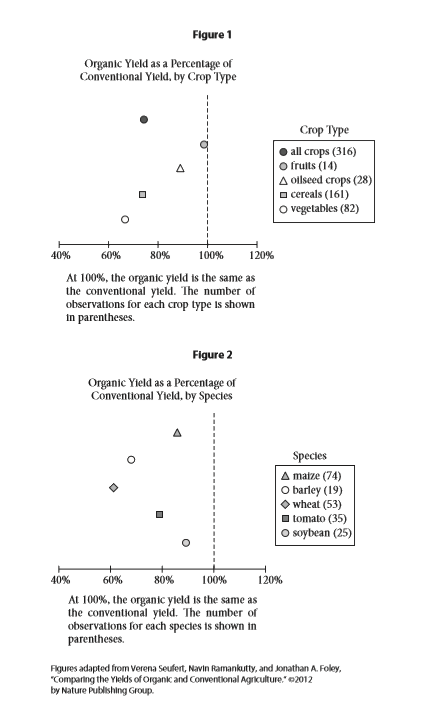
Which choice provides the best evidence for the answer to the previous question
View SolutionWhen it comes to energy, everyone loves efficiency. Cutting energy waste is one of those goals that both sides of the political divide can agree on, Line even it they sometimes diverge on how best to get 5 there. Energy efficiency allows us to get more out of our given resources, which is good for the economy and (mostly) good for the environment as well. In an increasingly hot and crowded world, the only sustainable way to live is to get more out of less. to Every environmentalist would agree. But change the conversation to food, and suddenly efficiency doesn't look so good. Conventional industrial agriculture has become incredibly efficient on a simple land to kind basis. Is Thanks to fertilizers, mechanization and irrigation, each American farmer feeds over 155 people worldwide. Conventional farming gets more and more crop per square foot of cultivated land—over 170 bushels of corn per acre in Iowa, for 20 example—which can mean less territory needs to be converted from wilderness to farmland. And since a third of the planet is already used for agriculture—destroying forests and oilier wild habitats along the way--anything that help us produce more food on less land would seem to he good for the environment.Of course,that’s not how most environmentalists regard their a rugul a[a leaf ygreen].They have embraced organic food as better for the planet—and healthier and tastier,too—than the stuff produced by agricultural corporations.Environmentalists disdain the enormous amounts of energy needed and waste created by conventional farming,while organic practices—for go in gartificial fertilizers and chemical pesticides—are considered far more sustainable. Sales of organic food ros e7.7% in 2010,upto $26.7 billion—and people are making those purchases for their consciences as much as their taste buds. Yet a new meta-analysis in Nature does the math and comes to a hard conclusion:organic farming yields 25% fewer crops on a verage than conventional agriculture.More land is therefore needed to produce fewer crops—and that means organic farming may not be as good for the planet as we think.
In the Nature analysis, scientists from McGill University in Montreal and the University of Minnesota performed an analysis of 66 studies comparing conventional and organic methods across so 34 different crop species, from fruits to grains to legumes. They found that organic farming delivered a lower yield for every crop type, though the disparity varied widely. For rain-watered legume crops like beans or perennial crops like fruit trees, organic is trailed conventional agriculture by just 5%. Yet for major cereal crops like corn or wheat, as well as most vegetables—all of which provide the bulk of the world's calories—conventional agriculture outperformed organics by more than 25%. 60 The main difference is nitrogen, the chemical key to plant growth. Conventional agriculture makes use of 171 million metric tons of synthetic fertilizer each year, and all that nitrogen enables much faster plant growth than the slower release of nitrogen from the 6S compost or cover crops used in organic farming. When we talk about a Green Revolution, we really mean a nitrogen revolution—along with a lot of water. Rut not all the nitrogen used in conventional /0 fertilizer ends up in crops—much of it ends up running off the soil and into the oceans, creating vast polluted dead zones. We're already putting more nitrogen into the soil than the planet can stand over the long term. And conventional agriculture also is depends heavily on chemical pesticides, which can have unintended side effects.
What that means is that while conventional agriculture is more efficient—sometimes much more efficient—than organic farming, there are trade-offs so with each. So an ideal global agriculture system, in the views of the study's authors, may borrow the best from both systems, as Jonathan Foley of the University of Minnesota explained: The bottom line? Today's organic farming 85 practices are probably best deployed in fruit and vegetable farms, where growing nutrition (not just bulk calories) is the primary goal. But for delivering sheer calories, especially in our staple crops of wheat, rice, maize, soybeans and so on, 90 conventional farms have the advantage right now.
Looking forward, I think we will need to deploy different kinds of practices (especially new, mixed approaches that take the best of organic 95 and conventional farming systems) where they are best suited—geographically, economically, socially, etc.
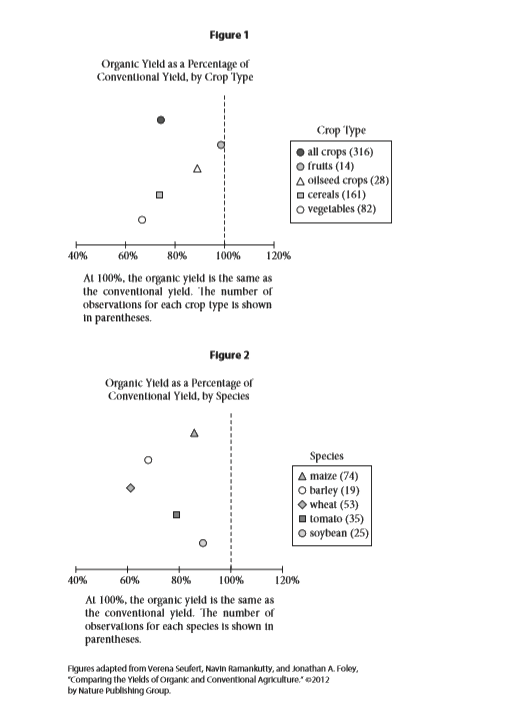
As used in line14,“simple”most nearly means
View Solution
